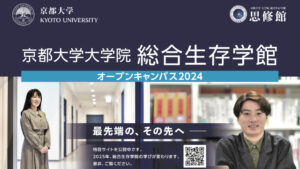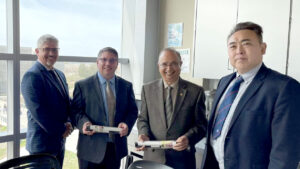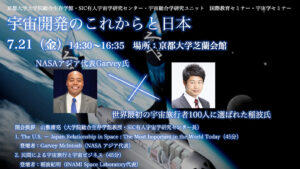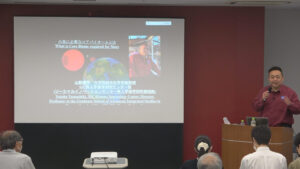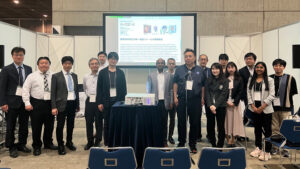Water quality degradation is becoming an increasingly acute problem in many parts of the world and is causing serious human health risks and environmental degradation. Improving water quality worldwide has been recognized as a key for enhanced water security in the post-2015 sustainable development. The proposal by the United Nations General Assembly’s Open Working Group on Sustainable Development Goals (SDGs) includes, as part of the goal on water and sanitation for all, a specific target to improve water quality and wastewater management. Consequently, improved water quality monitoring and data will be essential in monitoring and evaluation of progress towards the achievement of this SDG target on water quality and wastewater.
To support the SDG water monitoring framework, UNESCO organized an International Scientific Symposium on Scientific, Technological and Policy Innovations for Improved Water Quality Monitoring, that was hosted by Kyoto University, in Kyoto-Otsu, Japan, from 15-18 July 2015. This scientific meeting was organized in the framework of the implementation of Theme 3 “Addressing Water Scarcity and Quality” of the Eighth Phase of International Hydrological Programme (IHP-VIII) of UNESCO and as an activity contributing to the UNESCO-IHP International Initiative on Water Quality (IIWQ).
This scientific meeting aimed to enhance scientific capacities of countries to improve water quality monitoring at the national and global levels in order to support the monitoring and evaluation of the water-related SDG targets in the post-2015 sustainable development framework.
The meeting focused on three main objectives to:
1. Facilitate scientific discussion, knowledge exchange and collaboration among experts and stakeholders.
2. Establish a state-of-the-art of scientific research, methodologies, tools, technologies, and policy approaches on water quality and wastewater monitoring.
3. Collect practical cases of this stocktaking on water quality monitoring as a demonstration of the implementation of these tools and approaches.
The specific topics that were addressed included:
– Water quality monitoring focusing on different pollutants, including both traditional and emerging pollutants,
– Water quality indicators, data and reporting, with emphasis on new methodologies and tools such as bio-monitoring, investigative, GIS-based and “smart” monitoring
– Water quality assessment for surface and groundwater resources and special attention will be paid to the environmental issues
– Monitoring wastewater, with emphasis on safe wastewater reuse
– Policy measures including water quality regulations and guidelines, as well as the implementation of water quality monitoring
– Economic aspects of water quality monitoring and management
– Capacity building, awareness raising and cultural aspects with focus on gender issues and public involvement such as ‘citizen monitoring’
Participants included scientists, researchers, water quality experts, water professionals and practitioners, and public health and environmental specialists. Participation was also sought from policy makers and planners in water and related sectors, as well as from civil society representatives.
Based on scientific and practical contributions, this international scientific meeting resulted in technical and policy recommendations on improving water quality monitoring to address the global water quality challenge and to support enhanced water security for the post-2015 sustainable development.
Dr. Sarantuyaa Zandaryaa, Programme Specialist on water quality in the Division of Water Sciences of UNESCO, and Prof. Yosuke Yamashiki, Professor at Kyoto University, Japan, were in charge of the organization of the meeting.
Links:



